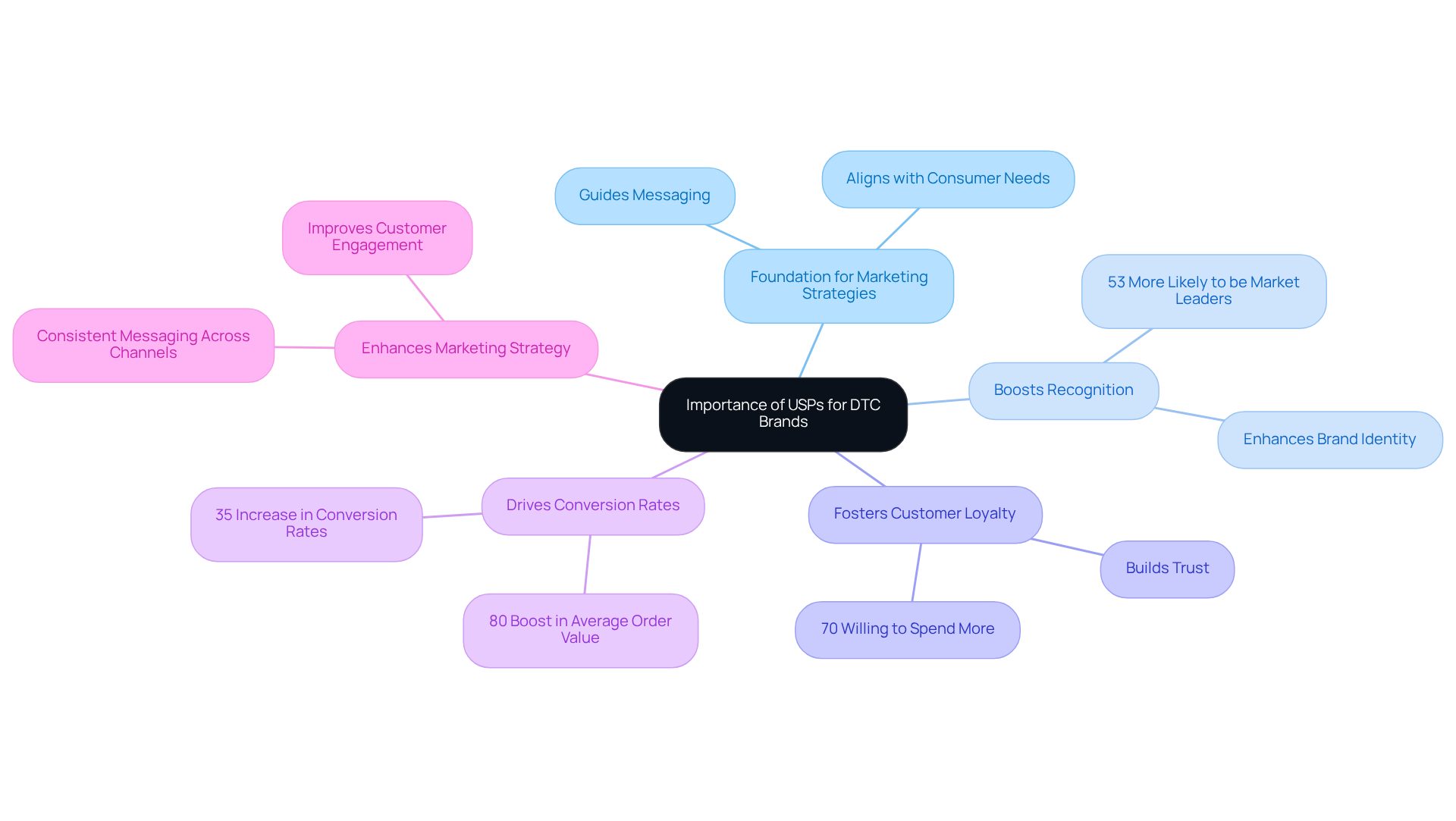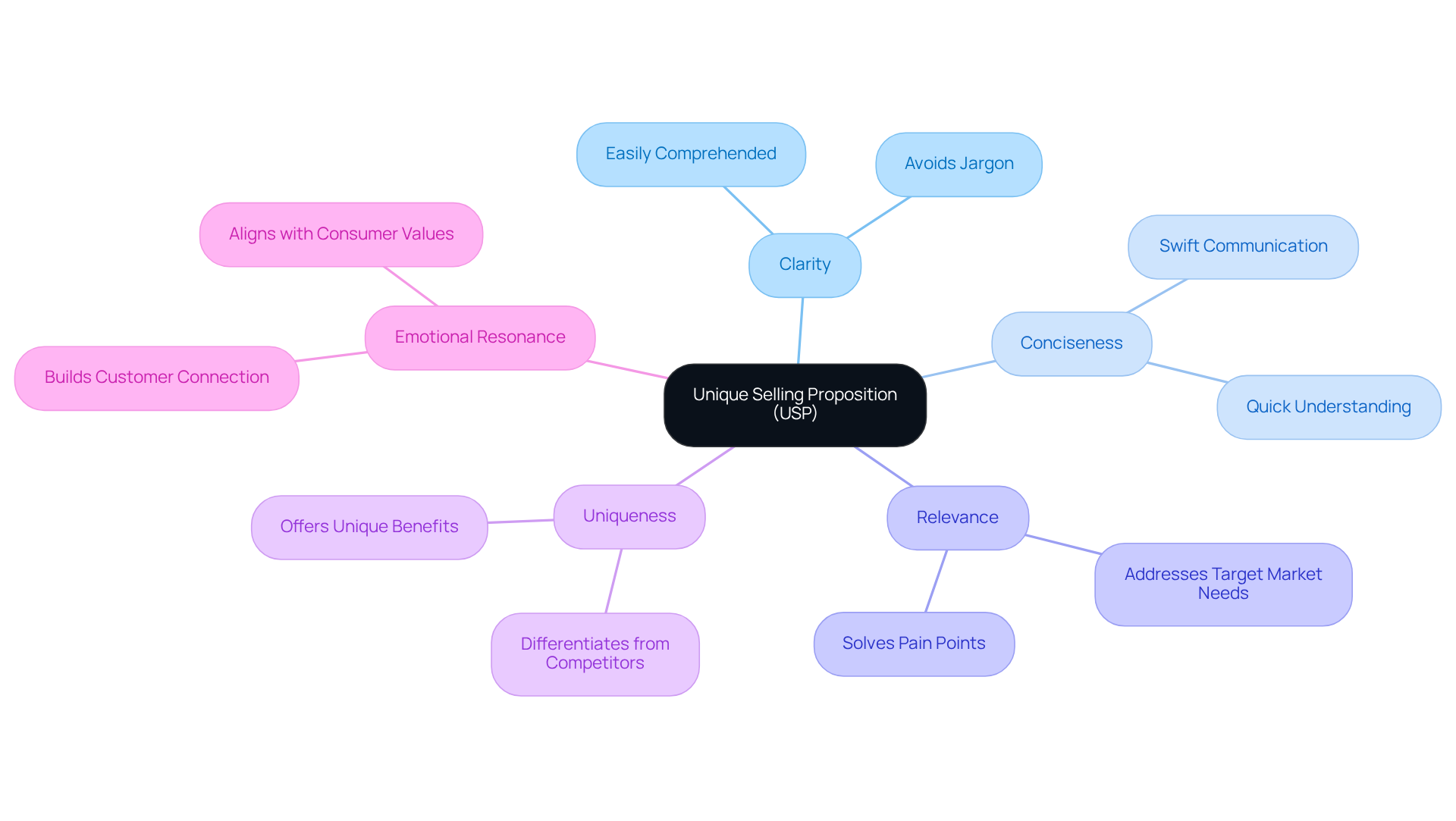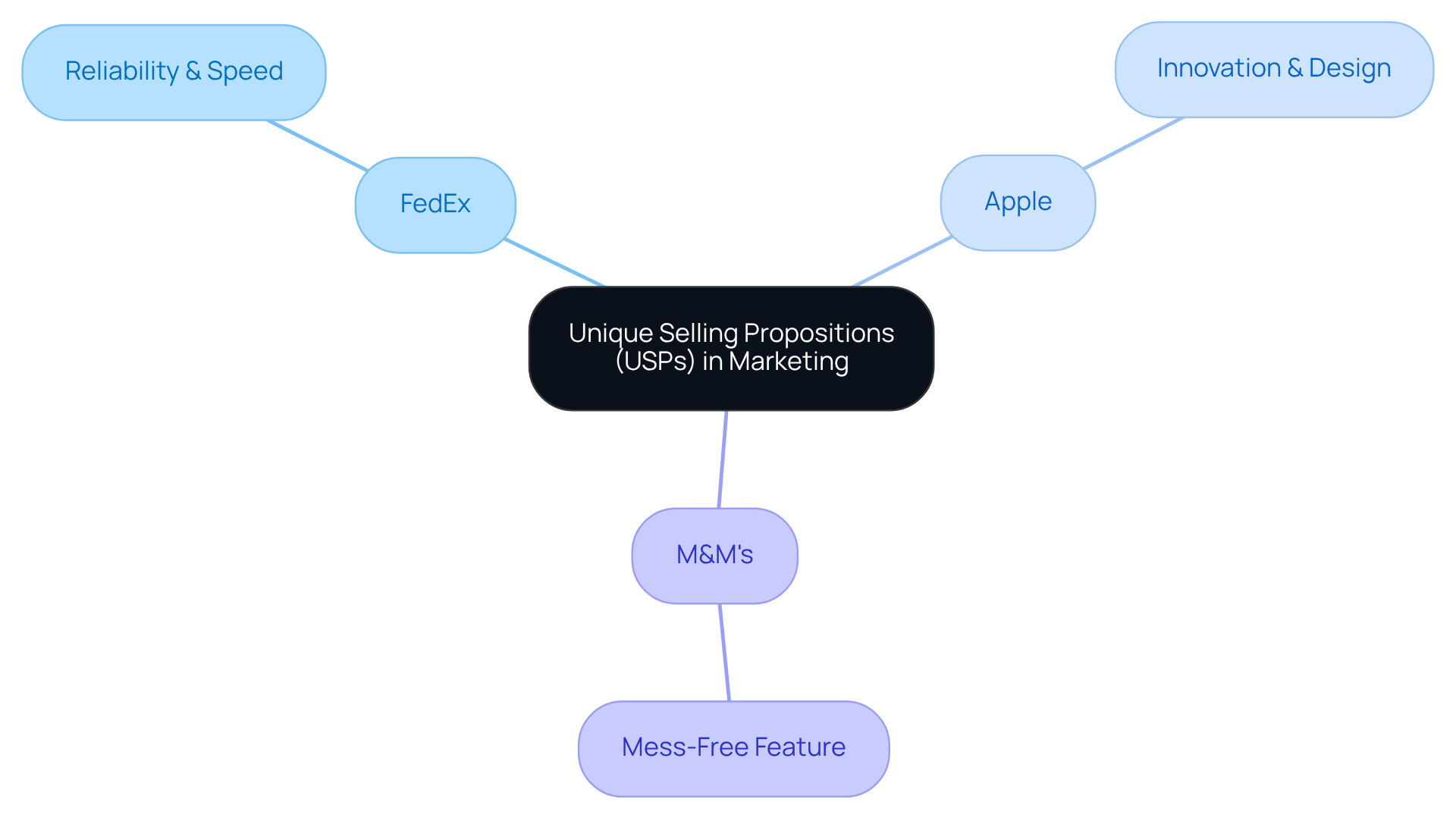
Overview
The Unique Selling Proposition (USP) in marketing stands as a fundamental concept that articulates the distinct benefits or advantages of a product or service, setting it apart from competitors and fostering enhanced customer engagement.
A well-defined USP is paramount for DTC brands, as it not only elevates brand recognition and cultivates customer loyalty but also propels higher conversion rates.
Case studies underscore this assertion, revealing significant sales performance improvements directly linked to effective USPs.
Thus, establishing a compelling USP is not merely advantageous; it is essential for driving success in the competitive marketplace.
Introduction
In today's crowded marketplace, understanding what sets a brand apart is more critical than ever—especially for direct-to-consumer (DTC) companies. The Unique Selling Proposition (USP) acts as a beacon, illuminating the distinct advantages a product or service offers. This makes it essential for effective marketing strategies. However, as competition intensifies, the challenge persists: how can brands articulate their unique value in a way that resonates with consumers and drives loyalty? This article delves into the significance of USPs for DTC brands, exploring their key characteristics and showcasing successful examples that highlight their impact on market positioning and customer engagement.
Define Unique Selling Proposition (USP) in Marketing
A Unique Selling Proposition (USP), or what is a USP in marketing, is an essential concept that articulates the unique advantage or benefit a product or service provides, setting it apart from competitors. It effectively communicates what makes a brand distinct and why consumers should choose it over others. A well-crafted USP emphasizes key features such as superior quality, innovative technology, or exceptional client support, resonating deeply with the target audience.
For example:
- Taylor Stitch underscores savings and sustainability through its crowdfunding model.
- Warby Parker revolutionizes eyewear retail with a , enhancing convenience for buyers.
- Pipcorn targets eco-friendly and health-conscious consumers by promoting sustainable ingredients and family farms.
In the current competitive landscape, with over 110,000 DTC brands operating in the U.S., knowing what is a USP in marketing is vital for clarifying a brand's positioning and value proposition. It drives client engagement and significantly boosts Conversion Rate Optimization (CRO) efforts, leading to sustainable growth and profitability.
Case studies from Parah Group illustrate how a $30M apparel company improved its conversion rates by 35% through strategic homepage redesigns and gamified shopping experiences, showcasing the direct correlation between a strong USP and effective CRO strategies.
Regularly reviewing and refining the USP based on client feedback is crucial for maintaining relevance and effectiveness in marketing strategies. As Jack Nicholaisen observes, adapting your USP according to customer input demonstrates attentiveness and care for their experience, fostering loyalty and ensuring your USP remains pertinent.

Explore the Importance of USPs for DTC Brands
For direct-to-consumer (DTC) companies, knowing what is a USP in marketing is crucial for standing out in a saturated marketplace. Understanding what is a USP in marketing acts as a foundation for marketing strategies, allowing companies to articulate their unique value effectively. Understanding what is a USP in marketing is essential, as it not only but also fosters customer loyalty and drives higher conversion rates. In an environment where consumers face countless options, knowing what is a USP in marketing simplifies purchasing decisions, steering potential buyers toward a preferred brand. Additionally, understanding what is a USP in marketing enhances the overall marketing strategy, ensuring consistent messaging across various channels and fortifying brand identity.
Research indicates that understanding what is a USP in marketing helps companies develop a strong unique selling proposition, making them 53% more likely to be perceived as market leaders, which highlights its role in building trust and loyalty among customers. Furthermore, 70% of consumers are willing to spend more on products or services that offer a distinct advantage, which underscores what is a USP in marketing and its significance in nurturing client loyalty. Consequently, DTC companies that understand what is a USP in marketing can anticipate substantial improvements in customer retention and engagement.
Parah Group's case studies vividly illustrate this impact. For example, a $30M apparel company that optimized its homepage to showcase social proof and customer reviews experienced a 35% increase in conversion rates. Similarly, a cleaning product company that refined its value propositions and bundling options achieved an 80% boost in average order value (AOV). These results underscore what is a USP in marketing, as a well-crafted USP captures attention and leaves a lasting impression, significantly enhancing brand recognition.
Brands that fail to define what is a USP in marketing risk blending in with competitors, leading to customer confusion and missed opportunities. Parah Group sets itself apart from other CRO agencies by emphasizing profitability and sustainable growth, ensuring that the strategies implemented not only enhance USPs but also contribute to long-term success.

Identify Key Characteristics of an Effective USP
A compelling Unique Selling Proposition (USP) answers the question of what is a USP in marketing by embodying several critical characteristics:
- Clarity
- Conciseness
- Relevance
- Uniqueness
- Emotional resonance
Clarity guarantees that the message is easily comprehended by the intended audience, while conciseness aids in the swift communication of unique advantages. A strong USP must also be relevant to the target market, effectively addressing their specific needs and pain points. Uniqueness is vital; it should offer something that competitors do not, in a crowded marketplace. Moreover, a compelling USP should elicit an emotional reaction, promoting a stronger bond with customers.
For instance, TOMS Shoes exemplifies this with its USP, 'With every pair you purchase, TOMS will help a person in need.' This statement not only highlights a unique benefit but also resonates with socially conscious consumers. This emotional appeal is vital; studies indicate that 40% of consumers appreciate companies that align with their values. Thus, a clear understanding of what is a USP in marketing is essential for fostering customer loyalty and engagement.
Furthermore, companies such as Apple and Peloton illustrate how effective USPs can establish strong market positions. Testing various USPs through A/B testing can assist companies in identifying which messages connect most effectively with their audience.

Examine Examples of Successful USPs in the Market
Numerous brands have adeptly leveraged what is a USP in marketing to create a distinct presence in the market. Take FedEx, for example, whose USP—'When it absolutely, positively has to be there overnight'—underscores reliability and speed, appealing directly to customers who prioritize prompt delivery. In a similar vein, Apple's USP centers on innovation and design, encapsulated in their slogan, 'Think Different.' This positions Apple as a vanguard of technology and creativity. Another noteworthy instance is M&M's, which champions its USP of 'Melts in your mouth, not in your hands,' highlighting a unique product feature that effectively addresses consumer concerns regarding messiness. These instances illustrate what is a USP in marketing, demonstrating how it can powerfully and distinguish it from competitors.

Conclusion
A Unique Selling Proposition (USP) stands as the cornerstone of effective marketing, distinctly highlighting what differentiates a brand in a crowded marketplace. It encapsulates the essence of a brand’s unique advantages, guiding consumers toward informed purchasing decisions. Understanding and articulating a strong USP is essential for brands, particularly in the direct-to-consumer (DTC) sector, where competition is fierce and options abound.
This article has shared key insights regarding the importance of USPs for DTC brands, emphasizing their role in enhancing brand recognition, fostering customer loyalty, and driving higher conversion rates. Successful companies exemplify how a well-defined USP can lead to substantial improvements in customer engagement and retention. Moreover, the characteristics of an effective USP—clarity, conciseness, relevance, uniqueness, and emotional resonance—are vital in crafting messages that resonate with the target audience.
Ultimately, the significance of a Unique Selling Proposition extends beyond mere marketing strategy; it shapes a brand's identity and fosters lasting connections with consumers. DTC brands that prioritize the development and refinement of their USPs can not only stand out in a saturated market but also cultivate a loyal customer base. By embracing the principles outlined in this article, brands can leverage their unique strengths, ensuring they remain relevant and competitive in an ever-evolving landscape.
Frequently Asked Questions
What is a Unique Selling Proposition (USP) in marketing?
A Unique Selling Proposition (USP) is a concept that defines the unique advantage or benefit a product or service offers, distinguishing it from competitors and communicating what makes a brand distinct.
Why is a USP important for a brand?
A USP is important because it clarifies a brand's positioning and value proposition, drives client engagement, and significantly boosts Conversion Rate Optimization (CRO) efforts, leading to sustainable growth and profitability.
Can you provide examples of effective USPs?
Yes, Taylor Stitch emphasizes savings and sustainability through its crowdfunding model, Warby Parker offers a home try-on program for convenience, and Pipcorn promotes sustainable ingredients aimed at eco-friendly and health-conscious consumers.
How does the competitive landscape affect the need for a USP?
With over 110,000 direct-to-consumer (DTC) brands in the U.S., having a clear USP is vital for standing out in a crowded market and effectively communicating a brand's unique value.
How can a strong USP influence conversion rates?
A strong USP can lead to improved conversion rates, as evidenced by case studies showing companies like Parah Group increased their conversion rates by 35% through strategic redesigns and enhanced customer experiences linked to their USP.
How often should a brand review its USP?
Brands should regularly review and refine their USP based on client feedback to maintain relevance and effectiveness in their marketing strategies.
What role does customer feedback play in shaping a USP?
Customer feedback is crucial for adapting a USP, as it demonstrates attentiveness to consumer needs and helps ensure the USP remains pertinent and effective in fostering loyalty.
FAQs











